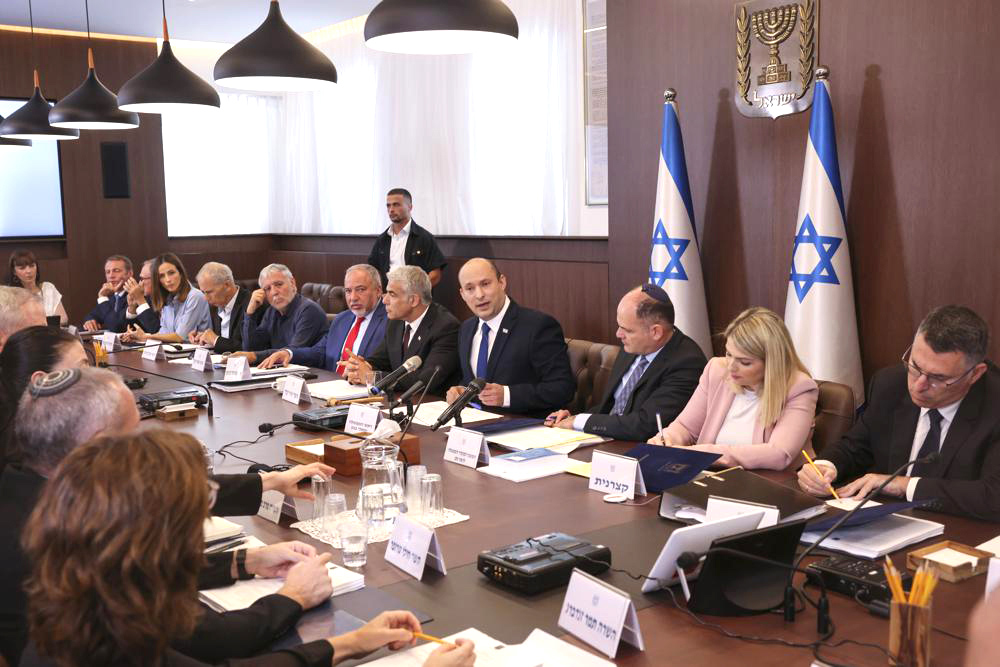Edited by: TJVNews.com
Israeli Prime Minister Naftali Bennett on Monday morning appeared for the first time before the Knesset’s Foreign Affairs and Defense Ministry, emphasizing that Israel is not obligated to keep a nuclear agreement made by other countries with Iran, as was reported by Israel National News.
“I attribute great importance to the Knesset’s parliamentary oversight of the work of the government in all areas, especially the most sacred of all – the national security of Israel,” Bennett began. “The national security situation of Israel is good and is getting stronger, but it is not free of challenges that we will detail later.”
“The primary importance this year is stabilizing the Israeli system. The Israeli system had been deteriorating for several years, which severely impaired the national security of Israel in all its aspects. We have stabilized the system, we passed a budget, the Israeli economy is strong and is growing by approximately 7% thanks to our policy against lockdowns, which has allowed the economy to return to normal. Thanks to this growth, we are taking quite a significant amount of money and investing in strengthening the IDF and the entire security establishment.
“I would say that this is strengthening of a kind we have not seen in years,” Bennett said, as was reported by INN. “This strengthening is important for our existence and I am very pleased about it and am determined to complete it quickly.”
The Times of Israel reported that Bennett’s comments came as the IDF was working intensively to prepare for a potential military strike on Iran’s nuclear facilities, amid growing concerns that ongoing talks between the world powers and Tehran in Vienna about curbing the latter’s nuclear program may result in an agreement that Israel deems unacceptable, or in no agreement whatsoever.
Speaking to the Knesset’s Foreign Affairs and Defense Committee, Bennett said, “We are investing in security rearmament of the IDF and the entire defense establishment. I would say this was rearmament that we haven’t seen for years. This rearmament is important to our survival, and I am very glad about it and am determined to see it through quickly.”
He added that, “In terms of the Vienna talks, the nuclear talks — we are indeed concerned. It is important for me to say and to clarify here in a way that can’t be misunderstood: Israel is not part of the agreements, Israel is not bound by what is written in the agreements if they are signed, and Israel will continue to ensure its full freedom of operation in any place and at any time, with no limitations.”
The Times of Israel reported that Bennett’s government increased the 2022 defense budget to nearly NIS 60 billion ($19.2 billion), a large chunk of which was to be earmarked for planning on military engagement with Iran, including billions to upgrade or procure vehicles, ordnances and more.
On Sunday, Iran’s Foreign Minister Hossein Amir-Abdollahian said that talks between Tehran and world powers to revive the Obama inspired 2015 nuclear deal are approaching a “good agreement” but reaching one soon depends on the other parties, as was reported by INN.
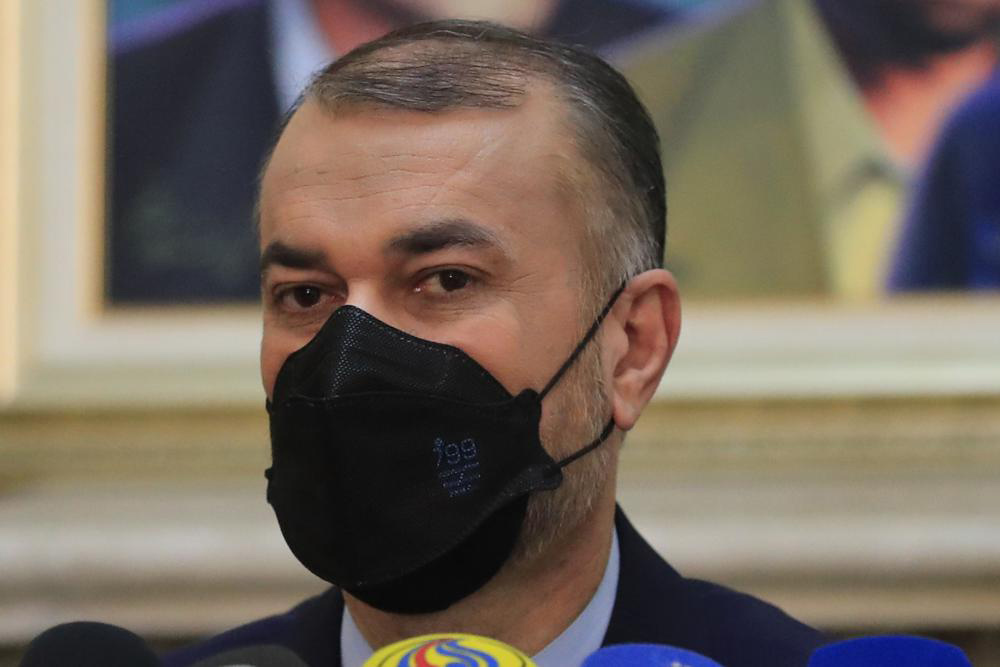
“The initiatives of the Iranian side and the negotiations that have taken place have put us on the right track,” Amir-Abdollahian was quoted by AFP as having said.
“We are close to a good agreement, but to reach this good agreement in the short term, it must be pursued by the other side,” he added.
INN reported that Iran has gradually scaled back its compliance with the 2015 nuclear deal it signed with world powers in response to former President Donald Trump’s withdrawal from the agreement in May of 2018.
However, it has held indirect talks with the US on reviving the deal. Negotiations to restore the deal resumed in late November after they were suspended in June.
Amir-Abdollahian said on Sunday the Islamic Republic was not looking to “drag out” negotiations, as was reported by INN.
It is “important for us to defend the rights and interests of our country”, he said.
Amir-Abdollahian stated that “yesterday, France played the role of a bad cop, but today it is behaving reasonably.”
“Yesterday, the American side had unacceptable demands, but today we believe that it has adapted to the realities” of the situation, he added. “At the end of the day, a good deal is an agreement that satisfies all parties.”
The INN report indicated that a spokesman for Iran’s foreign ministry said last week that Iran has detected a new “realism” on the part of Western countries.
“We sense a retreat, or rather realism from the Western parties in the Vienna negotiations, that there can be no demands beyond the nuclear accord,” foreign ministry spokesman Saeed Khatibzadeh told reporters, according to the AFP news agency.
At the same time, he added, “It is too early to judge if the United States and the three European countries have drawn up a real agenda to commit to lifting sanctions.”
The Islamic Republic has repeatedly demanded that the US lift sanctions imposed on Iran and also reassure Iran it will not abandon the deal again as a precondition for its returning to compliance with the deal, according to the INN report.
US officials have said that while they prefer the diplomatic route to reach an agreement with Iran, there are other options on the table should that fail.
INN also reported that on Sunday, White House national security adviser Jake Sullivan warned that Iran will face severe consequences if it attacks Americans, including any of those sanctioned by Tehran for the 2020 killing of top General Qassem Soleimani in a drone strike.
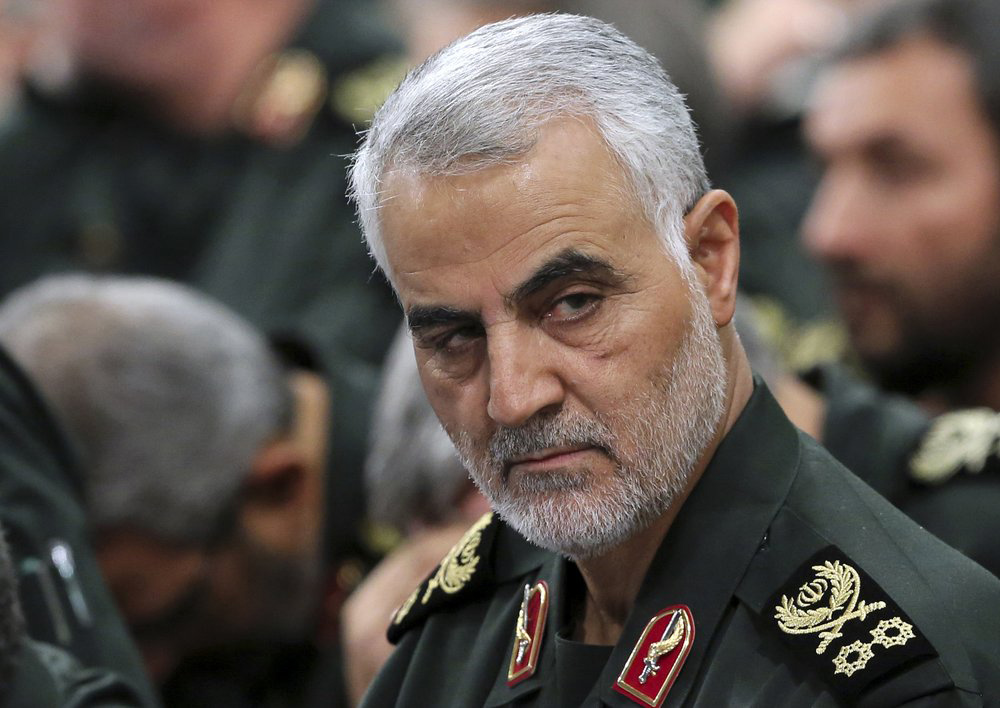
“We will work with our allies and partners to deter and respond to any attacks carried out by Iran,” Sullivan said in a statement quoted by Reuters. “Should Iran attack any of our nationals, including any of the 52 people named yesterday, it will face severe consequences.”
INN reported that the comments came a day after Iran imposed sanctions on dozens of Americans, many of them from the US military, over the 2020 killing of Soleimani.
Iran’s Foreign Ministry said 51 Americans had been targeted for what it called “terrorism” and human rights violations. The step lets Iranian authorities seize any assets they hold in Iran, but the apparent absence of such assets means it will likely be symbolic.
It was not clear why Sullivan’s statement referred to 52 people when Tehran said it had sanctioned 51, as was reported by INN.
Iran’s sanctions included General Mark Milley, chairman of the Joint Chiefs of Staff as well as former White House national security adviser Robert O’Brien.
Iran in 2020 issued an arrest warrant against then President Donald Trump and asked for Interpol’s aid in detaining him in the killing of Soleimani, as was reported by INN. Interpol swiftly rejected the request, saying its guidelines for notices forbids it from “any intervention or activities of a political” nature.
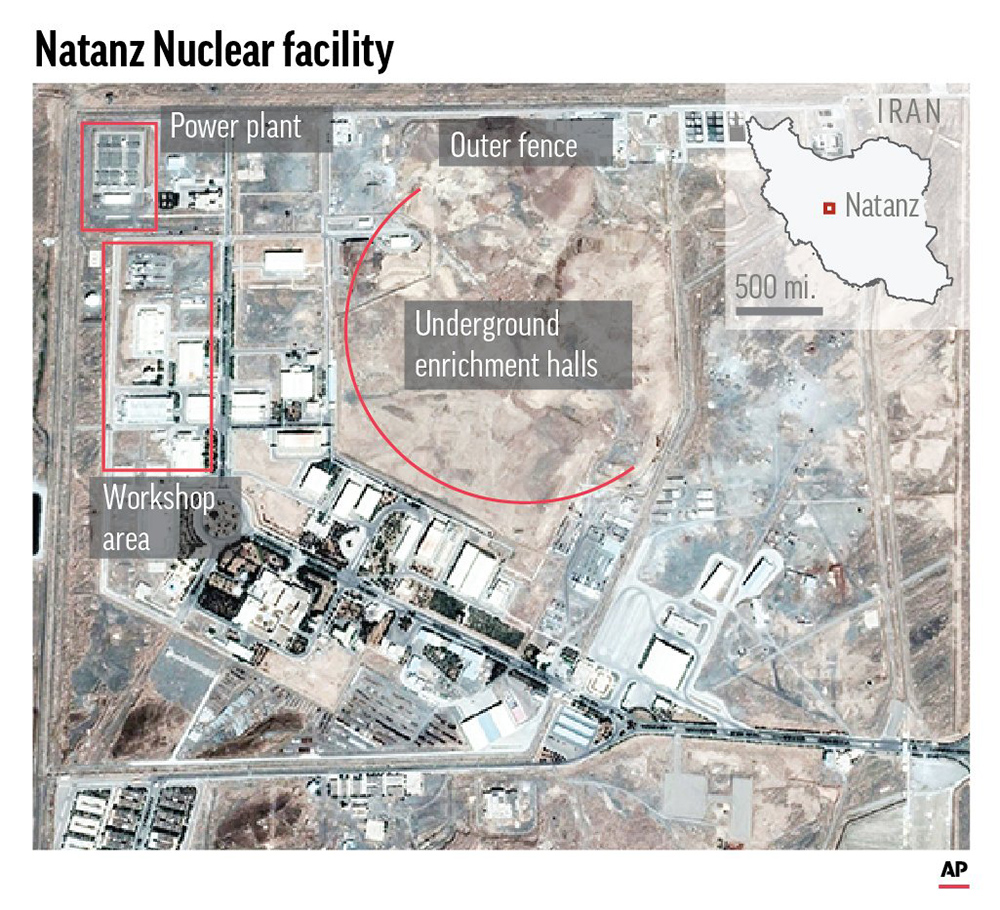
Last Tuesday, World Israel News reported that the Iran’s president threatened revenge against Trump unless he is put on trial for the assassination two years ago.
“The aggressor and the main assassin, the then-president of the United States, must face justice and retribution,” President Ebrahim Raisi told thousands of followers in the country’s main event marking the exact date in 2020 that Soleimani was killed in his car in Iraq by American-sent drones, as was reported by World Israel News.
Trump, former Secretary of State Mike Pompeo, and “other criminals” should be put on trial “in a fair court where their horrible crimes were addressed and they faced justice for their actions,” he added.
“Otherwise, I will tell all US leaders that without a doubt the hand of revenge will emerge from the sleeve of the Muslim nation.”
As head of the Iranian Revolutionary Guards Corps’ (IRGC) Quds Force, Soleimani led the country’s foreign campaigns that included controlling proxy terrorist groups in Syria, Iraq, Lebanon, Yemen and the Gaza Strip, as was reported by WIN.
When announcing the “successful precision strike,” Trump said it had killed “the number one terrorist anywhere in the world,” who had been planning to attack four U.S. embassies and posed an imminent threat to the country’s security. His administration’s policy on those terrorists who threatened Americans and their allies was that “We will find you, we will eliminate you.” And under Soleimani’s years-long leadership, he said, the Quds Force had “targeted, injured and murdered hundreds of American civilians and servicemen.”
The WIN reported indicated that Trump never regretted the move, telling campaign rallies before the 2020 elections that the arch-terrorist “was the king of the roadside bomb,” responsible for thousands of civilians losing arms and legs in Iraq, Afghanistan and elsewhere.
The threats against senior American figures are not new. Just over two weeks after the assassination, the IRGC commander, Maj. Gen. Hossein Salami, warned, “Americans should know that we will target anyone who has had a role in the cowardly assassination of General Soleimani.”
Iran’s Supreme Leader, Ayatollah Ali Khamenei, also vowed retribution, saying in December 2020 that “Those who ordered the murder of Gen. Soleimani, as well as those who carried this out, should be punished. This revenge will certainly happen at the right time.”
WIN reported that during this year’s commemoration the Islamic Republic did not just point an accusing finger at the past administration. Its foreign ministry tweeted Friday that “the current US government bears definitive international responsibility for this crime.”
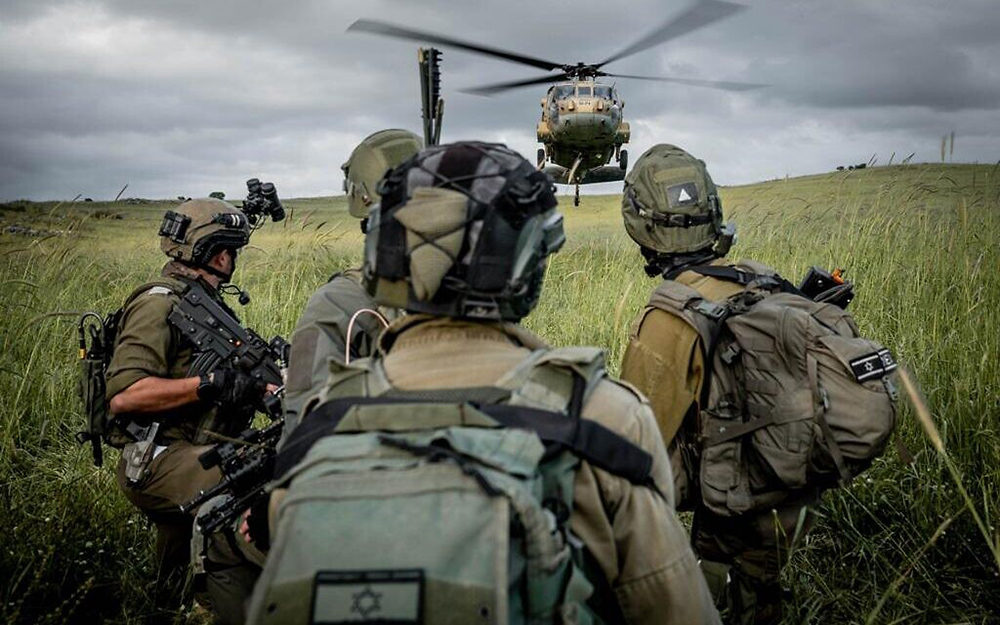
Iraq has similarly issued a warrant for Trump’s arrest as part of a Baghdad court’s investigation into the killing of top Iraqi paramilitary commander Abu Mahdi al-Muhandis, who died in the same US drone strike that killed Soleimani.
INN reported that last week, Iran announced it seeks to prosecute 127 suspects for involvement and cooperation in the elimination of Soleimani.
No details were provided on the identity of the suspects which Iran seeks to prosecute.
On Tuesday, World Israel News reported that a senior official from the Popular Front for the Liberation of Palestine (PFLP) praised Soleimani for his efforts in smuggling weapons to terror groups in the Gaza Strip during an interview with Tasnim News.
The Iranian news agency, which is owned by the Islamic Ideology Dissemination Organization, hosted the head of the PFLP’s military wing, Khaled Jibril, who repeatedly referred to Soleimani as a martyr. Soleimani was assassinated in a drone strike ordered by then-U.S. president Donald Trump in January 2020.
The WIN report indicated that Jibril had enthusiastic praise for Soleimani, whom he credited with “creating a balance of military power between the Palestinians and the Zionist enemy,” meaning Israel.
“This great martyr chose a process in his life that transformed him from a simple builder to an international commander who was able to completely change the geography of the region,” the Jerusalem Post quoted Jibril as saying of Soleimani in the Arabic language video.
Jibril insinuated during the interview that Gaza terror groups’ rocket stockpiles were bolstered by Iran, crediting the Islamic Republic with providing much of the weaponry used during the May 2021 Israel – Gaza clash, as was reported by WIN.
“We were in the rocket arsenals of the Palestinian resistance. We all know that the martyr Qassem Soleimani played a pivotal role in bringing the Palestinian resistance to a state of self-sufficiency at this level of missile arsenal,” he said.
“Hajj Qassem [Soleimani] made a great effort to support the Palestinian resistance groups. We and you know that the Gaza Strip is a narrow geographical area that has been surrounded by the Zionist regime from land, sea and air, but despite this, the last battle….witnessed a qualitative and significant change.”
Jibril appeared to be referencing the rocket barrages on Tel Aviv, which were previously unseen in earlier conflicts, as was reported by WIN.
Notably, much of Jibril’s comments implied that Iran had a heavy hand in shaping violent Palestinian attacks and campaigns against Israel.
“What martyr Qassem Soleimani did is over, and we are now in another generation that we must continue his path,” the Jerusalem Post translated Jibril as saying.
“Soleimani completed all the strategic projects he had built,” he said, which included “the ‘Strategic project’ of 2000 [the Second Intifada] and 2006 defeat of the Zionist regime in Lebanon [the 2006 Israel – Lebanon war].”
(Sources: World Israel News, Israel National News)




